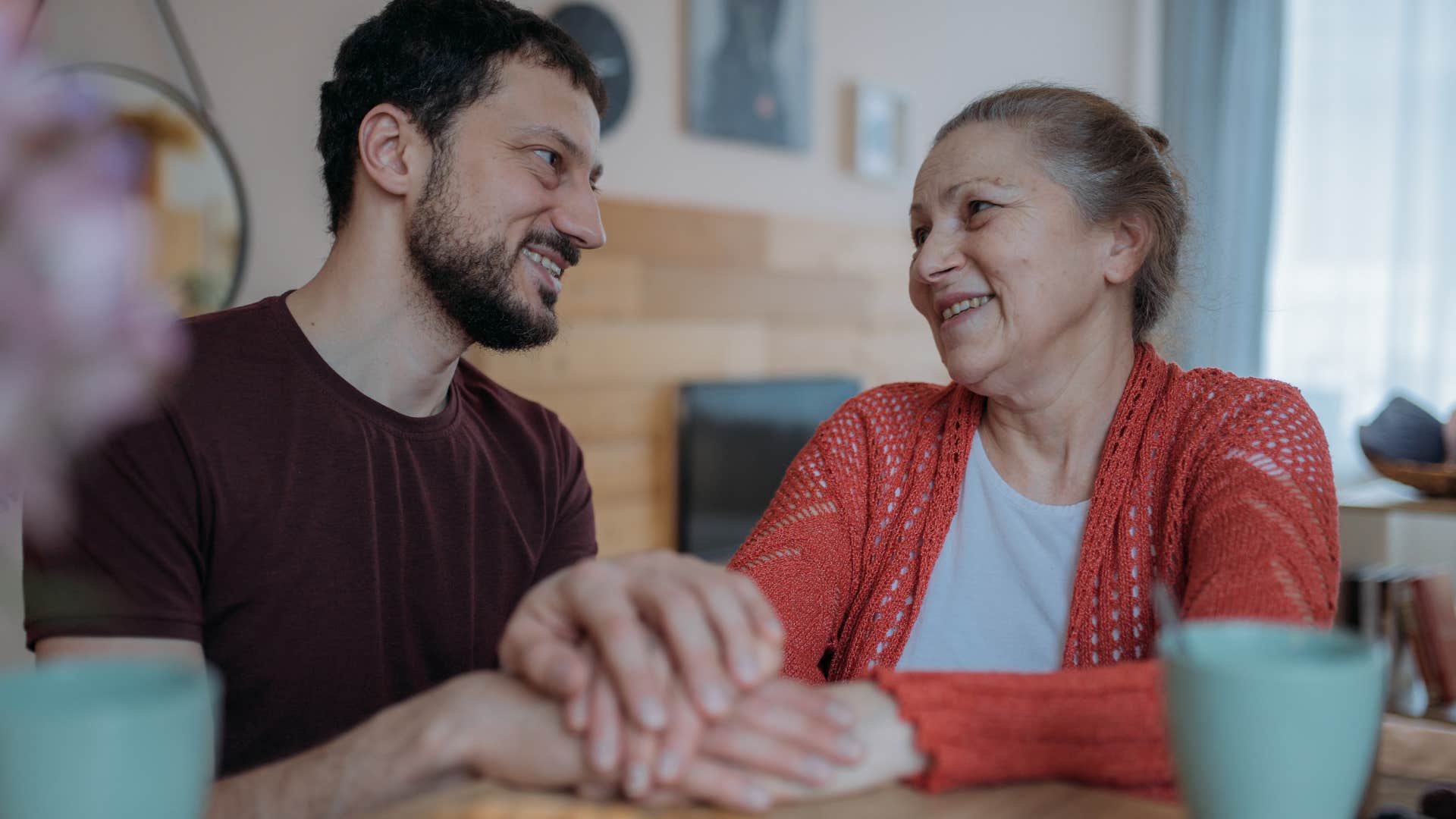Many people struggle to maintain healthy relationships with their parents into adulthood, oftentimes because of deep-rooted traumas, resentment, and unaddressed concerns that have followed them into new relationships and connections. Nearly 20% of young adults admit their relationship with their parents is “poor,” according to Pew Research Center studies.
With such complex and often toxic family dynamics, the enviable traits parents who stay close to their adult kids usually have aren’t as common as you’d expect. You have to maintain the supportive and compassionate nature of being a parent, whilst exemplifying a level of respect that’s definitive of healthy adult connections and companionship — and it’s not an easy feat.
Here are 10 enviable traits parents who stay close with their adult kids usually have:
1.They’re self-assured and confident.
 Lightfield Studios | Shutterstock.com
Lightfield Studios | Shutterstock.com
Many insecure parents actively sabotage their adult children’s success, from professional work to financial security to parenting styles, to assert their superiority and make themselves feel better about their own mistakes. According to Julie L. Hall, author of “The Narcissist in Your Life,” this kind of gaslighting is a key indicator of a deeply insecure parent.
By genuinely celebrating their children’s accomplishments and making space for recognition, healthy parents can stay close to their adult children by remaining self-assured in their own success as parents rather than encouraging a toxic competitive dynamic between adults.
2.They’re open communicators.
 People Images Yuri A | Shutterstock.com
People Images Yuri A | Shutterstock.com
According to Cleveland Clinic psychologist Susan Albers, resentment harms romantic and familial relationships. Sparked as early as childhood, resentment in many children from unmet needs, unrealistic expectations, and ineffective parenting styles often follow them into adulthood.
However, healthy parents with open communication styles, dedication to trust, honesty, and emotional intelligence do not allow resentment to linger. They attack conflicts head-on, act vulnerably without judgment, and instill a sense of confidence in their children to advocate for themselves—even in family relationships and disputes.
3.They’re careful about offering advice.
 ViDI Studio | Shutterstock.com
ViDI Studio | Shutterstock.com
Healthy parents ask for permission before they offer their advice to adult children — a healthy communication style that experts like women’s advocate coach Tara Mohr wholeheartedly suggest is the key to maintaining a healthy connection in adulthood.
While parents play a foundational role in their children’s lives early on, guiding their perception of healthy relationships with their own and offering occasional advice through transitional life changes, in adulthood, these children often need a listening ear from their parents rather than advice.
Of course, the best parents are willing to share their experiences and advice when warranted. Still, offering unwanted advice only sparks frustration in adult children who want to vent.
4.They’re emotionally intelligent.
 Inside Creative House | Shutterstock.com
Inside Creative House | Shutterstock.com
According to a 2012 study on the connection between family dynamics and childhood emotional awareness, emotional intelligence is defined by empathy, self-awareness, and, of course, the ability to maintain and navigate relationships.
Healthy parents who instill this skill in their children early in life by crafting an open space for them to learn, heal, and cope with intense emotions not only set them up for future success in romantic and platonic connections in their own lives but also for fulfilling familial relationships down the road. They know their role in their adult children’s lives, even if that means stepping back or knowing when to intervene during big life moments.
5.They’re flexible and willing to let go.
 Ground Picture | Shutterstock.com
Ground Picture | Shutterstock.com
Our parents will always play a fundamental role in our adult lives, whether we’ve gone “no-contact” with them or see them several times a week, so it’s impossible to ignore how their relationships, attitudes, and expectations influence us.
Especially considering younger generations have lived at home with their parents for much longer than older generations, navigating early adulthood with children in close quarters can be tumultuous.
The ability to let go is one of the enviable traits parents who stay close to their adult children usually have, not only because it protects everyone’s emotional stability but also because it safeguards the health of a future relationship without threats of resentment and frustration. They are willing to let go, trust they’ve done the right thing as parents, and let their children take autonomy over their own lives — even if that means setting healthy boundaries or encouraging them to take uncomfortable steps forward.
6.They’re adventurous.
 Krakenimages.com | Shutterstock.com
Krakenimages.com | Shutterstock.com
Parents who maintain healthy relationships with their adult children usually create a healthy distance between each other — not to the point of ignorance or concern, but to a point where both parties can prioritize their own hobbies, do their own thing, and live in their own ways without disrupting or upsetting the other.
Healthy parents of adult children live their lives — prioritizing their own wellbeing, health, and identity freely, without constantly worrying about or considering how their adult children are navigating their own. When they come back together, as adults, friends, or supporters, they not only have enough to talk about, they’ve been investing time into themselves that feeds into the healthy nature of their connection.
7.They set and respect boundaries.
 GaudiLab | Shutterstock.com
GaudiLab | Shutterstock.com
According to therapist Dr. Rachel Glik, many adult children struggle to harbor healthy relationships with their parents because they’re unable to set healthy boundaries with them — whether they’re about needing space, protecting their parenting style with their own children, or simply carving out a space to navigate life without constant criticism from their parents.
However, healthy parents who stay close with their adult kids usually have an enviable ability to respect their adult children’s boundaries, communicate questions and reservations, and set time and space aside for themselves. They recognize that their children have their own lives, as do they, and their time, energy, and emotions should be equally supported and advocated for in adulthood.
8.They prioritize their own personal relationships.
 Krakenimages.com | Shutterstock.com
Krakenimages.com | Shutterstock.com
According to expert life coach Ruth Schimel, a parent’s relationships with others during their child’s early years are incredibly impactful on their well-being as adults, and the quality of their connections in adulthood is equally influential.
When healthy parents have partners or friends who emotionally support them in adulthood, adding value to their lives and “filling their cup,” they show up better for the adult children in their lives. Without the unneeded stress of an unfulfilling partner or a manipulative friend, they can grow, love, and celebrate right alongside their kids without judgment or concern.
9.They’re enthusiastic about celebrations.
 Grusho Anna | Shutterstock.com
Grusho Anna | Shutterstock.com
According to social psychologist Fred Bryant, when we relish in celebrations and express gratitude in our daily lives, we “buffer ourselves” against the bad and build a resilience that protects us from future conflict, stress, and anxiety. Even when it’s as minor as getting a card from your parents after a tough week at work, feeling appreciated, loved, and supported is profoundly impactful.
Healthy parents who maintain good relationships with their adult children know the power of celebration and aren’t shy about prioritizing it.
10.They’re lifelong learners.
 Lordn | Shutterstock.com
Lordn | Shutterstock.com
It takes work to relearn your position and role in an adult child’s life, especially if you’ve always considered them a close friend, supporter, or impactful pillar in your life throughout adulthood. However, to harbor a healthy relationship as they enter adulthood, it’s necessary to prioritize that place.
Great parents who cultivate healthier adult relationships with their kids aren’t shy about adopting a “lifelong learner” attitude toward it—they ask questions, get curious, and have open discussions about how to better show up as parents, supporters, and friends, even during tumultuous life moments and transitions.
Zayda Slabbekoorn is a News & Entertainment Writer at YourTango who focuses on health & wellness, social policy, and human interest stories.

